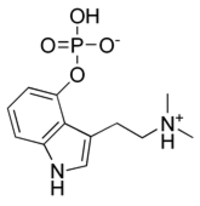Psilocybin and Mystical Experience

The Psilocybin Molecule
We have discussed mystical experiences a couple of times recently. They are important not only because of what they may teach us about altered states of consciousness, but because they may contain genuine revelations about the nature of reality and they are invariably profoundly meaningful to the person having them.
Earlier this year there was a paper that seemed to come in under some people’s radar, though several heavyweights in the world of psychopharmacology spoke approvingly of the research.
The paper was entitled, “Psilocybin can occasion mystical-type experiences having substantial and sustained personal meaning and spiritual significance.” There are also some superb commentaries on the original paper, all of which are available for free download if you click on the links above.
So what got everyone so excited?
Psilocybin is a psychedelic alkaloid that has been used for religious purposes for centuries. The researchers conducted a double-blind study on the acute and longer-term psychological effects of a high dose of psilocybin. What was particularly important was that the 36 experimental subjects had no previous experience of hallucinogens but who were regularly participating in religious or spiritual activities.
It is also important that the experiments were performed in comfortable, supportive surroundings. The last thing that anyone wanted was for people to have a “Bad trip” and to be left without care and support.
They were given psilocybin and methylphenidate (Ritalin) in separate sessions, the methylphenidate sessions serving as a control and active placebo; the tests were double-blind, with neither the subject nor the administrator knowing which drug was being administered. The degree of mystical experience was measured using a questionnaire on mystical experience developed by Ralph W Hood.
61% of subjects reported a “complete mystical experience” after their psilocybin session, while only 13% reported such an outcome after their experience with methylphenidate. Two months after taking psilocybin, 79% of the participants reported moderately to greatly increased life satisfaction and sense of well-being.
About 36% of participants also had a strong to extreme “experience of fear” or dysphoria (eg, a “bad trip”) at some point during the psilocybin session (which was not reported by any subject during the methylphenidate session), with about one-third of these (13% of the total) reporting that this dysphoria dominated the entire session. These negative effects were reported to be easily managed by the researchers and did not have a lasting negative effect on the subject’s sense of well-being.
The observation that psilocybin reliably elicits a transcendent, mystical state tells us that investigations of these drugs may help us understand molecular alterations in the brain that underlie mystical religious experiences.
But the key point to be made is that finding a biochemical basis for mystical experiences does nothing to belittle them. The biochemical and neurological approaches have nothing to say about the personal meaning and the cultural and social components of the experience. To use Ken Wilber’s terminology, this research is only addressing the Upper Right Hand Quadrant.
Important work to be sure, but it would be a mistake to try to reduce mystical experiences to 5HT2A,C receptors alone.
“For what is Mysticism? It is not the attempt to draw near to God, not by rites or ceremonies, but by inward disposition? Is it not merely a hard word for ‘The Kingdom of Heaven is within’? Heaven is neither a place nor a time.”
Florence Nightingale (English Pioneer of Nursing Known as the “Lady with the Lamp,” 1820-1910)
“The mystical life is the centre of all that I do and all that I think and all that I write. …I have always considered myself a voice of what I believe to be a greater renaissance – the revolt of the soul against the intellect.”
— William Butler Yeats (Irish Poet, Dramatist, Writer and, in 1923, Winner of the Nobel Prize in Literature, 1865-1939)






